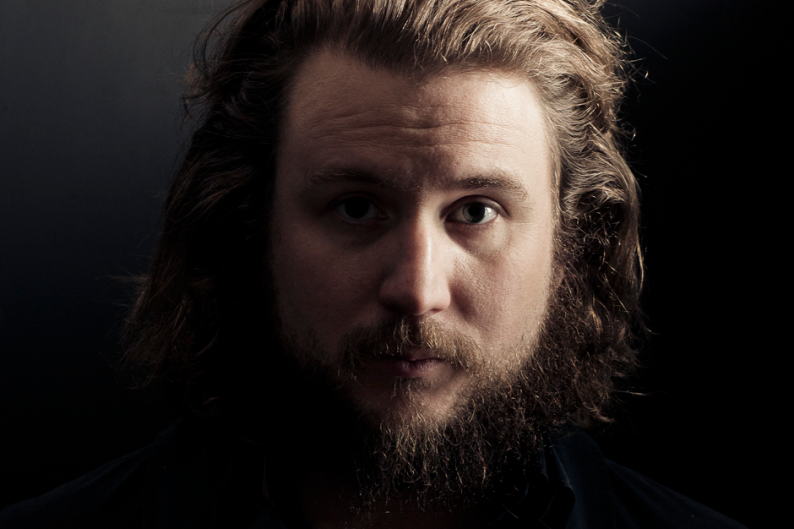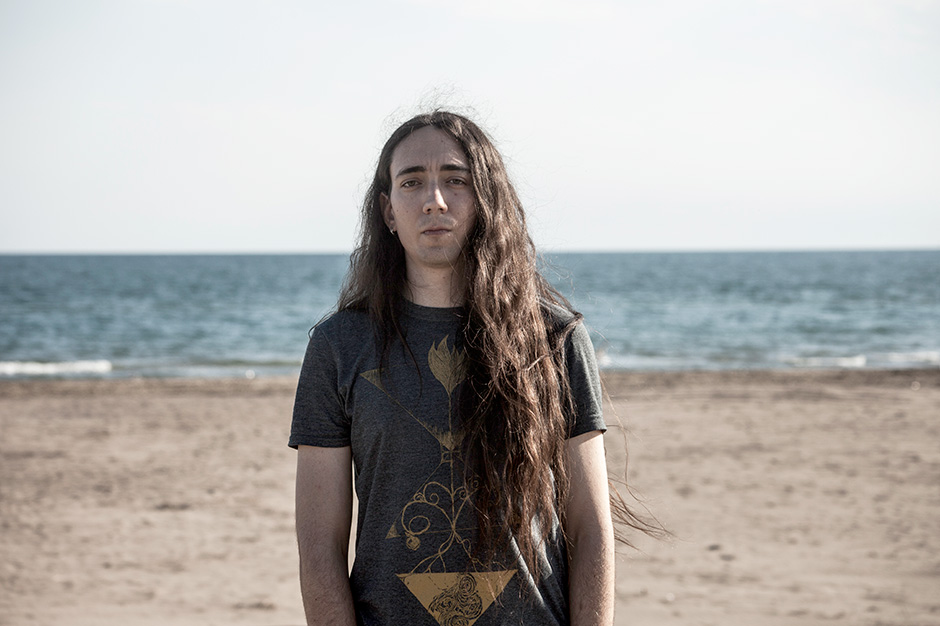If bands want to keep their credibility intact, they aren’t supposed to discuss intended audiences or obvious influences — or audiences and influences they’re willing to abandon. They just make the music they make, man. But the fourth album from French black metal band Alcest clearly proclaims that frontman Neige is no longer concerned with cred — or maybe even black metal — at all.
In fact, the cathedral-size Shelter foregoes almost all traces of heaviness at all, opting instead for shoegaze dream states bolstered by guest spots from Slowdive frontman Neil Halstead and longtime Sigur Rós producer Birgir Jón Birgisson. It’s a transitional album, divergent for Alcest but a bit overly familiar if you’ve heard either of those other bands; nonetheless, the prospect of breaking up with black metal seems to have inspired Neige, even if it will probably cost him a kvlt of longtime fans.
Earlier this week, Neige was in Eastern France, rehearsing with the touring four-piece iteration of Alcest at the home of his drummer, Winterhalter. They’d been working, he said, to make this relatively feather-light new material fit into a set list with the older, heavier stuff — adding distortion, tweaking rhythms, massaging the set list. Those changes seem to be the one concession he’s willing to make to his heavy-metal past. “This record is going to get a lot of hate — it already is getting some,” he says, laughing. “That is something that crossed my mind. But what can we do?”
Shelter is such a stark stylistic change for Alcest, far away from black metal, toward the post-rock and the shoegaze you’ve flirted with in the past. When did you know that’s the direction it would take?
I never felt completely accomplished with the metal songs, because it always sounded too heavy for me. But that’s what I was used to doing, playing this kind of metal-shoegaze stuff. I started as a metal kid, playing black metal when I was a young teenager. I got used to those songs.

Also Read
Compact Discs: Sound of the Future
I started thinking about this in a more concrete and precise way during the recording of our previous album, Les Voyages de l’Âme. It felt strange to go to the studio and not do exactly what you’d like to do in that moment. It was very important for me to do this genre switch; otherwise, it would’ve felt really strange for me — and very insincere. The big challenge was not to lose the essence of Alcest and the core, but just changing the approach.
What, then, is the essence of Alcest?
It’s a band I created in order to translate into music a very special experience that happened to me when I was a child — something very spiritual and difficult to describe. Music can describe it better than words. There is a lot of hope, a lot of nostalgia, something very uplifting and spiritual, these otherworldly melodies. I do this music precisely to not have to speak about what is behind the music. I just make this music, and it’s coming from the deepest parts of myself. It’s almost subconscious.
There’s always been an escapist aspect of Alcest, which links well with European literature, too — Tír na nOg, New Atlantis, and so on. Does Shelter represent an extension of that idea?
In Celtic literature, you have the idea of Tír na nOg, this island of eternal youth. I had a song called “Tir nan og” on the first album. But Shelter, this time, was quite simple. It’s just a safe place to escape, this secret thing we all have when life is going too fast and you are full of anxiety. I think we are living in a very tough era, and it is very easy to get lost and forget who you are. This shelter is a very precious thing that is never changing and that you always go back to.
For me, it’s this very special relationship I have with the sea. I love to spend time by the sea, just having very simple moments disconnected from the stress of everyday life and sitting on the beach and watching the waves. I also love to swim and have fun, and I used to go with some friends of mine, so we’d party at night on the beach. This shelter could be anything — a person, a movie, music. It’s something that reminds you in a way of who you are, like a mirror, and convinces you to get lost.
When did this relationship with the sea develop?
My parents always loved the sea. We used to go there every two weeks. My father had a boat, so we went sailing. I hated it, actually. I stopped going when I was a teenager, and I noticed I really missed it. Since this moment, I try to go by the sea once or twice a year, just to spend time and go relax. Not the touristic crowded coast — I know the good spots. I just love the water. When you watch the sea, it’s cleaning your thoughts and cleaning your soul. You don’t need to go into the water to take a bath.
You’ve talked about growing up and out of black metal, and now about growing up and falling back in love with the ocean. Are these just symptoms of you becoming an adult?
I had this very regular childhood with teenage angst. When I was 14 or 15 years old, I had this year or two where I listened to black metal, only black metal and nothing else. I was trying to be dark. I say trying because I never was dark enough. I tried to be an evil person, but I wasn’t the best at that. When I was 17, I started going out from that and discovering indie rock and post-punk and new wave. It’s thanks to music that I could choose that different path, in a way — discovering bands like the Cure or Joy Division, bands that showed me that music could be very deep and atmospheric outside of black metal. I think I was always a very open-minded person, apart from one very specific year. This part of my past, I don’t like that much to think about it. It’s not something I would do again if I had the choice.
How do you hope Shelter changes Alcest’s audience?
I don’t want this record to appeal to a larger audience. I just hope it will appeal to more indie-rock listeners. Shelter is really not a metal record. From the few things I have read, some people are really, really mad. They complain about how different we sound. As a band, to keep being inspired and motivated, you have sometimes to evolve and make drastic choices. If people don’t like it, there are plenty of great bands they could listen to.
What if it fails completely, if metal fans turn from Alcest and indie-rock listeners don’t respond as you’d hoped?
I gave the very best of myself on this record, and we put as much love and sincerity and integrity as we could. If the people don’t like it, what can I do? I think the most important thing is not to do the best record in the world, but to give the best of what you can do. It’s not going to change anything in the future, if people don’t like this record. I will not bring back the screams to make the people happy. Even if I love Alcest fans, I think integrity is the most important thing when you make a band. When you stop being sincere, that’s when the people really leave you.
Why make this album in Iceland, in Sigur Rós’ Sundlaugin studios with Birgir Jón Birgisson?
We did two albums before with the same kind of guitar sounds. This time we wanted every song to sound a different way from the other ones and to experiment more with everything — adding new instruments, adding strings, glockenspiel, vibraphone. The mood in the studio was very nice and very relaxed and cool. We always work with nice producers in cool studios, but the studios we were in were in the business of producing metal records, so they were used to metal bands. They had metal habits: SM57 mics, Marshall amps, these kind of things. The studio in Iceland is just a rock studio, a music studio where they produce all kinds of stuff. There were no boundaries or limits to creativity. The studio guy really got what we wanted to achieve. He’s used to dramatic music.
Iceland fit well with this concept of Shelter. It is a place that is isolated from everything, and it feels like being in a creative bubble all the time. I would say that Icelandic people are much more creative and spontaneous than people in France or other European countries. It’s like everyone has a band, or sometimes they are in three bands — one metal band, one twee-pop band, one folk-rock band. There’s so much music for so few people.
You mentioned the pace and worries of the modern world. Alcest has a Twitter account, but how much do you participate in social media?
I don’t have a Facebook. I am one of the very few persons that doesn’t have a Facebook account. But I am completely consumed by everything else, like everybody. I have a cell phone. I don’t know how many e-mails I get a day, especially at this time, because we have to do a lot of work for the album. I think we are all consumed by this idea of shelter, especially at these times when we’re surrounded by all this social media and technology and stressful jobs.
In France, the situation is very bad. Everybody is so anxious, and there is an extremely bad mood in the air. When I turn on my TV, after 40 seconds, I am just so fucking depressed.
Do you hope this music gives some people relief, then, that it’s a respite for listeners?
For me, if Alcest’s music had one single goal, it’s making people feel better. That is the only purpose of this music, to bring some assurance to the people. I feel like we live in very disillusioned times. People don’t believe in anything. They don’t believe in unity, because everyone has their worries. We don’t believe in God. I think there is no spirituality left in our time. If my music could help someone in one way or another, that is the ultimate goal for me.
Alcest has been a sequestered project of sorts, one that’s never seemed very big on collaborators. But Shelter features Neil Halstead and a decidedly non-metal producer. Why is the project suddenly open to those new ideas?
Alcest was really personal. I was not open to collaboration at all before. Back then, I had a very precise vision of what I wanted to do. But for Shelter, something that was part of the process was keeping things very spontaneous and natural, not trying to overthink. I wanted it to be honest, simple, light, airy, and positive. I wanted to make things easy to have a lot of pleasure in making this record, to go to a nice studio, to have my favorite musicians doing some guest spots. The first person I thought about was Neil Halstead, because I’m the biggest Slowdive fan. It was a dream for me to have this guy on a record. Iceland, Sigur Rós studios, Neil Halstead: It’s perfect.




